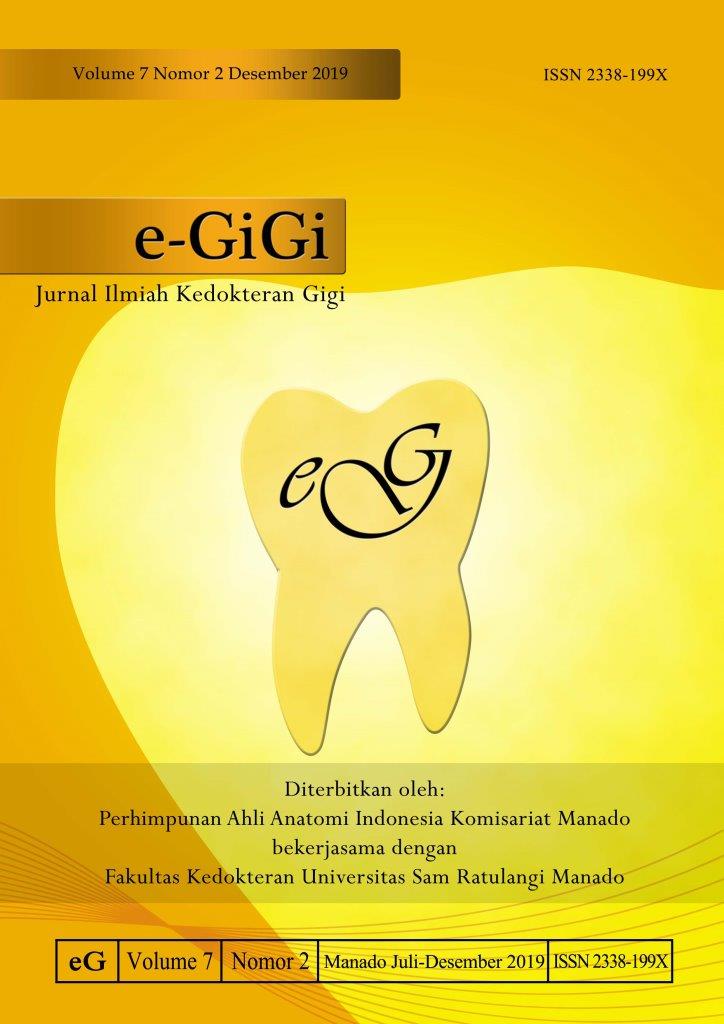Hubungan Status Ekonomi dengan Keputusan Tidak Menggunakan Gigi Tiruan di Kelurahan Teling Atas
DOI:
https://doi.org/10.35790/eg.7.2.2019.25408Abstract
Abstract: High rate of tooth loss in Indonesia indicates that oral health is still a problem. Ideally, people who lose teeth will replace the missing teeth with using denture but not in the reality. Many factors could influence the background of people’s decisions, including cost. The relatively expensive cost of denture becomes an obstacle if the community is faced to various other needs that must be fulfilled including basic needs. Economic status will take a great deal in making decision. This study was aimed to assess whether there was a relationship between economic status and the decision of not using denture among people at Kelurahan Teling Atas. This was a descriptive analytical study with a cross sectional design. Population consisted of people who had tooth loss but did not replace it with using denture as many as 123 people. Samples were 55 people obtained by using purposive sampling method. The instrument in this study was a questionnaire. The results showed that 38.2% of respondents had low economic status, 25.4% had medium economic status, and 36.4% had high economic status. Respondents with positive decisions of not using dentures related to the cost were 62.09%. The Pearson chi-square showed a p-value of 0.003. In conclusion, there was a significant relationship between economic status and decision to not using denture.
Keywords: economic status, decision of using denture
Â
Abstrak: Tingginya angka kehilangan gigi di Indonesia menandakan bahwa kesehatan gigi dan mulut masih menjadi masalah. Idealnya masyarakat yang kehilangan gigi akan menggantikan gigi asli yang hilang dengan gigi tiruan, namun kenyataannya belum demikian. Banyak faktor yang melatarbelakangi keputusan masyarakat, antara lain faktor biaya. Biaya perawatan gigi tiruan yang relatif mahal menjadi kendala jika masyarakat diperhadapkan dengan berbagai alternatif kebutuhan yang harus dipenuhi, termasuk kebutuhan pokok. Status ekonomi dalam hal ini adalah daya beli masyarakat akan turut berperan dalam pengambilan keputusan dimaksud. Penelitian ini bertujuan untuk mengetahui adanya hubungan antara status ekonomi dengan keputusan tidak menggunakan gigi tiruan pada masyarakat di Kelurahan Teling Atas. Jenis penelitian ialah deskriptif analitik dengan desain potong lintang. Populasi penelitian ini yaitu individu yang telah kehilangan gigi namun tidak menggantikannya dengan gigi tiruan, berjumlah 123 orang. Jumlah sampel sebesar 55 orang, diambil dengan metode purposive sampling. Instrumen penelitian menggunakan kuesioner. Hasil penelitian menda-patkan responden dengan status ekonomi rendah sebesar 38,2%, status ekonomi menengah sebesar 25,4%, dan status ekonomi tinggi sebesar 36,4%. Responden dengan keputusan positif tidak menggunakan gigi tiruan terkait biaya sebesar 62,09%. Hasil uji statistik menggunakan Pearson chi square mendapatkan nilai p=0,003. Simpulan peneleitian ini ialah terdapat hubungan antara status ekonomi dengan keputusan tidak menggunakan gigi tiruan.
Kata kunci: status ekonomi, keputusan menggunakan gigi tiruan
Downloads
How to Cite
Issue
Section
License
COPYRIGHT
Authors who publish with this journal agree to the following terms:
Authors hold their copyright and grant this journal the privilege of first publication, with the work simultaneously licensed under a Creative Commons Attribution License that permits others to impart the work with an acknowledgment of the work's origin and initial publication by this journal.
Authors can enter into separate or additional contractual arrangements for the non-exclusive distribution of the journal's published version of the work (for example, post it to an institutional repository or publish it in a book), with an acknowledgment of its underlying publication in this journal.
Authors are permitted and encouraged to post their work online (for example, in institutional repositories or on their website) as it can lead to productive exchanges, as well as earlier and greater citation of the published work (See The Effect of Open Access).






